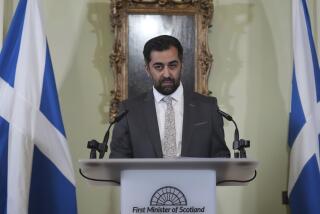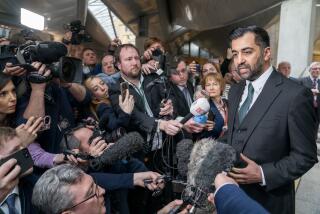National Agenda : Scots’ Sentiments Surge Toward Independence : * A new poll shows 50% want a divorce from Britain. The next election may put that view into the ballot box.
- Share via
EDINBURGH, Scotland — It is sometimes said that this lovely, Georgian-style city above the broad, glistening Firth of Forth is a capital without a nation.
Now, however, nearly three centuries after Scotland’s 1707 union with England, that saying may be on its way out. For the cause of Scottish nationalism has surged dramatically in recent months with an impetus that has surprised Scots themselves and shaken British politicians.
An independent Scotland is no longer seen as a vague concept or a rallying cry for Scottish extremists, but as a real possibility that has caught Britain’s major political parties unprepared.
And the next British general election, widely predicted for April 9, will have special significance for the 5.1 million Scots living in their solid northern cities, misty glens, heathered moors and highlands and craggy offshore islands. For that election will be read as a vote for home rule at the minimum, and possibly for outright independence. Either option would fundamentally alter the relationship under which Scotland has been fully integrated into Britain.
As Brian Groom, deputy editor of Scotland on Sunday, put it: “In Scotland, we will be having a completely different election. Essentially, it will be much more interesting than the one taking place in England.”
The upwelling of Scottish nationalism surfaced publicly late last month in an opinion poll published by the Scotsman, the Establishment daily. It showed for the first time that 50% of Scots favor independence.
Alex Salmond, 37, a soft-spoken former oil economist who heads the independence-minded Scottish National Party (SNP), believes that any vote that approaches 50% for his party in the general election will be tantamount to approval of Scottish independence.
Equally, he rejects any halfway house along the road to independence--namely devolution, a loose concept of home rule that would grant Scotland its own legislative assembly under the mantle of British sovereignty.
“That 50% polling figure was devastating,” he commented in his modest office just off Charlotte Square--a short walk from Edinburgh Castle and its skirling pipers. “It focused everyone’s minds, showing that half the Scots wanted independence, and 27% favoring some form of home rule, with only 19% approving of the status quo.
“So we are now in a race to win the majority of Scottish seats in the Parliamentary election, and if we do, we will then begin negotiations with London for Scottish independence.”
The political situation in Scotland presents different quandaries for Britain’s two major parties--the ruling Conservatives and the opposition Labor Party.
Scotland elects 72 members to the 650-seat British House of Commons. Of those, Labor has by far the largest number, with 48 seats. The Liberal Democrats have 10, and the SNP has five. The Conservatives, or Tories, rate only nine seats--having just lost one to the Liberal Democrats in a by-election late last year.
The Conservative government is against Scottish independence because it would diminish Britain both as a world player and in the European Community--and it could lead to secessionist movements in Wales and Northern Ireland. It is also acutely aware that many British voters object to the kind of home rule that would give Scotland its own assembly--allowing it to make separate laws for Scots, while at the same time electing parliamentary members to London who would legislate for the United Kingdom at large.
But staunch Tory support for the status quo in Scotland has cost the party dearly. Both the Scottish Conservative party and the national government are fiercely unpopular here.
So the betting is that while Prime Minister John Major “thinks that devolution is a bad idea,” as a senior aide put it, he will nevertheless after the election go along with some form of limited home rule for Scotland.
Independence has even greater pitfalls for the Labor Party, which backs a devolved assembly for Scotland with special legislative powers.
As the respected political columnist Frank Johnson put it: “Nearly one-quarter of the Labor Party’s parliamentary seats come from Scotland. If Scotland were independent (and those Labor seats lost), it would mean a permanent, inflexible Tory majority in the House of Commons. So Labor has to support more self-rule for Scotland--but short of outright independence.
“Conversely, some Tory politicians would love to see the recalcitrant Scots cut loose, thereby assuring themselves permanent political control over England.”
For their part, Scots argue that they are being unfairly governed by a Tory party which is now running in fourth place in Scotland: behind Labor, the Liberals, and the Scottish Nationalists.
In the drive for independence, Salmond and the SNP have picked up editorial support, notably from the tabloid Sun, which formerly was staunchly behind the union. With the blessing of Australian-born owner, Rupert Murdoch, the Scottish edition of the Sun last month came out with a front-page headline, above the cross of St. Andrew, emblazoned: “Rise Now and Be a Nation Again”--words from Scotland’s unofficial anthem, titled Flower of Scotland. “Why Scotland Must Have Independence,” read the subhead.
The nationalists also received a big boost when popular actor Sean Connery, an Edinburgh native, came out in support of independence, making front-page news in every paper in Scotland.
In addition to general unhappiness with London’s Conservative government, the Scottish independence movement is being fueled by the example of the former Soviet Union and Eastern Europe, and also by the magnet of the European Community.
While not a populous country, Salmond and others argue, Scotland is no smaller than some others in the European Community. Further, in addition to strong industries such as whiskey, electronics, textiles and tourism, Scotland has a solid financial services industry--Edinburgh is 13th in the world in terms of funds managed, behind Los Angeles but ahead of Chicago.
With a gross national product of about $80 billion in 1990, it would rank as the world’s 30th wealthiest country, just behind Saudi Arabia and Turkey and ahead of Poland, Iran and Venezuela.
Finally, supporters argue, if Scotland were independent, it would inherit a large share of North Sea oil revenues, since most British oil and gas wells are off its coast.
What would independence cost Scotland?
By most accounts, it receives more generous government subsidies than does Britain, subsidies it would lose if it were independent. Labor Party economics spokesman John Smith projects that an independent Scotland would run up a $13-billion deficit in its first year--a figure contested by the SNP’s Salmond.
Both Labor and the Tories argue that an independent Scotland would have to raise taxes to make up for the loss of subsidies from London, and that this would drive industry to move to Britain or Ireland.
As Alex Murdoch, president of the Dundee Chamber of Commerce, says: “Who is going to pay for a Scottish parliament, or for that matter, a Scottish assembly? If it means an extra tax burden that would make Scottish business uncompetitive, forget it.”
But Salmond maintains that his SNP is the wave of the future in Scotland.
“When we claimed in September that we would be challenging to win in Scotland,” he said in his soft burr, “the response from the unionists was loud guffaws. Now, far from laughing, we face a state of near hysteria from those trying to halt our surge.
“When we win, we would want a general election in Scotland, held under proportional representation for an independent Scottish parliament. That will give the people of Scotland the chance to decide who should be the first prime minister of an independent Scotland.”
A Wee Bit About Scotland
Population: 4.96 million
Language: English. Scottish Gaelic spoken in some areas.
Religion: Church of Scotland (established church--Presbyterian)
Who reigns and rules: Scotland was ruled as a separate kingdom until Act of Union in 1707, when its Parliament was assimilated into England’s. Its sovereign is British Queen Elizabeth II, and it has 72 members in House of Commons. Secretary of State for Scotland, Ian Lang, a British Cabinet member, is responsible for administering its affairs. But Scotland has its own legal, educational and local government systems.
Some Famous Scots: Among the thousands are Robert Burns, poet; James Watt, inventor of the steam engine; Alexander Fleming, developer of penicillin; Jackie Stewart, champion race car driver; Sheana Easton, singer; Sean Connery, actor.
Independent Ideas
Percentage favoring each of three options for Scotland.
Sept. 91
Independence: 37%
Devolution (home rule): 41%
Status quo: 19%
No opinion: 3%
Jan. 92
Independence: 50
Devolution (hime rule): 27
Status quo: 19
No opinion: 4%
SOURCES: The 1991 Almanac, Europa World Yearbook-1991, Political Handbook of the World-1991, The British Information Service; The Scotsman newspaper and ITN.
SOURCES: The 1991 Almanac; Europa World Yearbook, 1991; Political Handbook of the World, 1991; British Information Service
Glasgow, pop. 679,00; Edinburgh, pop. 423,300
More to Read
Sign up for Essential California
The most important California stories and recommendations in your inbox every morning.
You may occasionally receive promotional content from the Los Angeles Times.













